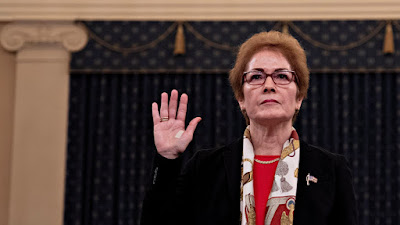Good bye, and good riddance to George Kent, Bill Taylor and Marie Yovanovitch. Thank you for your service to the country and your employment here has ended. You are no longer needed, so please collect your things and turn in your badges at the front desk.
They deserve to be fired because they attempted to circumvent or curtail Trump Administration policy with regards to Ukraine.
Article II of the United States Constitution grants the President sole and exclusive power to appoint 'ambassadors,' which in 1787 meant 'anyone who speaks to foreign governments on behalf of the United States of America.'
The U.S. Supreme Court decided in 1936 that the executive branch has "plenary and exclusive power of the President as the sole organ of the federal government in the field of international relations" U.S. v. Curtiss-wright Corp, 299 U.S. 304, 320 (1936).
Though it is not explicitly mentioned anywhere in the Constitution that the President has plenary power over foreign affairs, the Supreme Court ruled that the need for tact and secrecy necessitated the President to be able to make decisions without being constrained by the other governmental branches. The Supreme Court ruled that the only limit to the President's plenary power over foreign affairs was that they "must be exercised in subordination to the applicable provisions of the Constitution". U.s. v. Curtiss-wright Corp, 299 U.S. 304, 320 (1936). In other words, the Supreme Court ruled that the President had unlimited power over foreign relations as long as he did not do anything which explicitly violated the Constitution. It is important to note that the Supreme Court was very willing to give the President vast amounts of power at the time of Wright, which was just before the outbreak of World War II. This does not seem like much, but over the years a clear pattern has been established wherein the President's powers over foreign relations are greatly expanded during troubling times.
After the Iranian hostage crisis in 1981, the President made an executive order to seize all Iranian assets in the United States without the approval of Congress. Normally, Congress would have to approve of such an action, but in Dames Moore v. Regan the Supreme Court ruled that "though those settlements have sometimes been made by treaty, there has also been a longstanding practice of settling such claims by executive agreement without the advice and consent of the Senate." Dames Moore v. Regan, 453 U.S. 654, 679 (1981). The Supreme Court allowed the President to make an executive order based on an assumption that Congress would have approved based on similar legislation that it had previously passed. This shows another broadening of the President's power over foreign affairs, as the Supreme Court allowed the President to make an executive order that was not permitted by the Constitution. The Supreme Court's reasoning for allowing the President's power to be broadened was that the Iranian hostage crisis was an emergency situation and that in order to be able to handle the situation quickly and efficiently, the President's power over foreign affairs needed to be expanded. This is yet another example of the President's foreign affairs powers being increased during turbulent times.
Historians may debate when today's 'foreign service' morphed from the apolitical profession envisioned in the Rogers Act into the pit of vipers it is today, but no one can dispute that it has now become too big for its britches. If the 'foreign service' does not execute the President's explicit orders and carry out his foreign policy to his sole satisfaction, then they can be circumvented, fired or otherwise told to STFU and come home.
The foreign service does not formulate foreign policy. The President does. The foreign service may interpret his policy, but if it misinterprets that policy the President has sole and plenary authority to replace or remove the misguided people who don't get it.
What the American people watched on November 13 and 15 was the testimony of three members of the foreign service who don't get it. They also lack the humility required to understand that they serve at the pleasure of the President, even if they find it distasteful that their world view and President Trump's world view are worlds apart. That's too bad. Be the professionals you claim to be and do your job as your President has determined it to be.
There is similar bureaucratic entrenchment with regards to heatlthcare, transportation, environmental regulation, food safety, agriculture even tax policy. All of those are being dealt with too, but Trump has only been President for 33 months and dismantling the federal behemoth is taking a bit longer than expected, ok?
In 2016, Donald Trump made a campaign promise to drain the swamp of Washington DC. How this country dealt with both allies and adversaries was part of the quagmire and the system was broken in the eyes of the electorate. So they elected Donald Trump to do what he said he'd do.
That includes ridding the federal government of people like George Kent, Bill Taylor and Marie Yovanovitch.
Good bye, and good riddance. Who's next?


0 comments :
Post a Comment
You must have a Google Account to post a comment.
WARNING: Posting on this blog is a privilege. You have no First Amendment rights here. I am the sole, supreme and benevolent dictator. This blog commenting system also has a patented Dumbass Detector. Don't set it off.
Note: Only a member of this blog may post a comment.